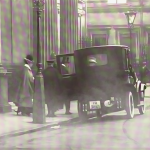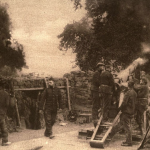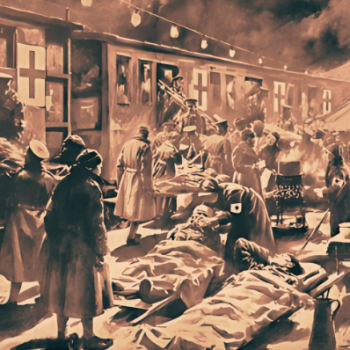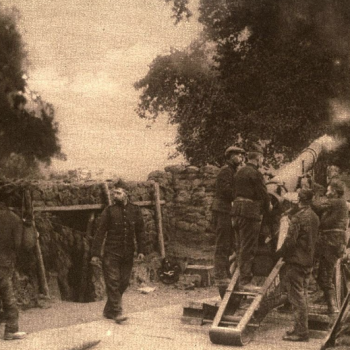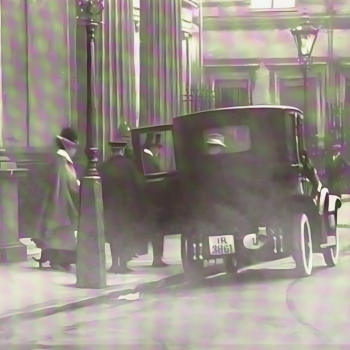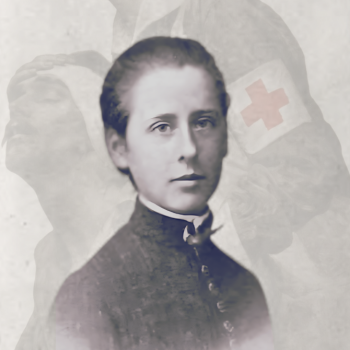PART III
THE RACE TO THE SEA
About the middle of September 1914, the world began to waken to a realization of the fact (still only dimly felt, however) that the War was entering a new phase; that the theatre of the fiercest conflict was to change, and those of us in England who were straining at the leash in our eagerness to get “over there,” breathlessly snatched at any, and all news which came from the front. Looking back upon that time, now that the years have given us not only a clearer knowledge of the actual military situation, denied us at the moment, but also a perspective, we can see that the rapidly moving and seemingly tangled events, so bewildering at all times to civilians, were in reality steadily shaping themselves into an orderly plan. The Germans had failed to reach Paris, and the Battle of the Marne had been followed by the Battle of the Aisne, which has often been spoken of as a transition battle; but while the enemy had succeeded in forming a new line stretching eastward from Noyon to Verdun, and was attempting a new offensive, hoping to bring about the decisive victory which they had failed to win at the Marne, the French High Command began their great flanking movement west of the Oise, turning around the German right, aiming first at St. Quentin in the hope of cutting off one of the chief lines of communication, then heading north toward Flanders. The Germans, of course, recognized the new danger. If the Allies should reach Belgium, they would join the Belgian Field Army still guarding Antwerp and stretching along the Scheldt, and the German occupation of Belgium would become very precarious indeed; further, and of well-nigh equal concern, all hope of taking the Channel ports—which it was now realized should have been taken at a much earlier stage of the War, when it would have been comparatively easy—all chance of seizing this most important strategic position, opposite the English coast, would be lost, and a trench deadlock would ensue. Hence during the latter half of September began the first phase of the “race to the sea,” now so famous in history; that dash northwards by the two opposing forces, in their gigantic struggle each to outflank the other, the result being an incredibly swift extension of the active front almost due north and south, instead of west and east, as formerly. If the Germans won in this desperate race; if they could seize Antwerp and annihilate the little Belgian Army, it would enable them to wheel sharply to the west, and by quick marching reach the coast (where in late September there was still a wide stretch of country between the Allied line and the sea) and sweep southward, seizing the Channel ports as they went, Calais being the special objective.
This is a very crude outline, even though viewed as it is now in retrospect, of the general military situation at the time that I first went to Belgium. Of course, only military experts could guess what was taking place. Civilians like myself, living in the very midst of the bewildering comings and goings of troops, could have only a vague and general idea of what was actually happening—even if we had had the time to think much about it. We saw but a small corner of the vast drama which was unrolling; the particular small comer where our work placed us, and I speak of this great phase of the War merely because it may be well to remind those who have momentarily forgotten the mighty “race to the sea”, what that “race” really was, and what it meant; also, because it naturally affected everything that we who were working in Belgium wanted to do or tried to do.
~
I have said that during the first days of the War I joined some Red Cross classes in London, in the hope of getting abroad with a recognized unit, but that, when the classes came to an end, there followed an unaccountable pause, a sudden cessation of activities. We were all left, as it were, dangling in midair. The organizer of the classes had been an acquaintance of mine in pre-War days, and she had urged me to join them, telling me that she had every reason to expect an Ambulance Corps to be formed from those students who successfully survived the examinations, a Corps which would probably be sent to Belgium. I now determined to go to her boldly and ask what the trouble was, and what her next move would be, for I was sufficiently “informed” to realize that one must have an official excuse for getting abroad; without it one would find it almost impossible to secure the necessary visa. The trouble turned out to be the not unusual one— misunderstanding with the Higher Authorities. “Red Tape” again. But she had not given up all hope of her Ambulance Corps, for she was leaving London early the next morning, alone, for Belgium, to “look over the ground” with an eye to establishing a foothold.
“I am convinced that the great thing is to be on the spot,” she said. “No earthly use to be planning work on one side of the Channel, when you yourself are on the other.”
“That is exactly my idea,” I exclaimed, “I’m going with you.”
There followed a somewhat animated discussion. She preferred, not unnaturally, to go alone, since she had no idea what she would be getting into “over there,” and I felt that she owed me at least this chance, since after all, she had urged me to join her classes, and I had in consequence lost all that good time. I frankly told her that I was merely making her my “official excuse,” because once in Belgium I had no intention whatever of volunteering in her Ambulance Corps unless it materialized immediately. Once on Belgian soil I intended to strike out for myself. On this basis she agreed to my joining her.
So, it came about that on that late September morning, after a rather hectic night spent in hurried preparations for the unimaginable venture on which I was embarking, I found myself, with a heavy tweed coat and a small hand bag (my only equipment) on the Ostende departure platform of Victoria Station, looking for my travelling companion. She came beaming cheerily through the queer, mixed crowd, evidently reconciled by this time to my presence. The platform was packed with every conceivable kind of traveler—save one. The usual tourist was conspicuous by his absence; it was no place for him; or, if he was there, he had been transformed beyond recognition into something serviceable. There were, of course, officers returning to the front; nurses going out either for the first time or after a short period of rest; war correspondents; chaplains; non-descript men in innocuous Norfolk jackets, who did not “look the part,” though somehow you knew that the Norfolk jacket was disguising a real mission; women in indescribable attire, half-masculine, half-feminine, for in those first weeks, before so much individual effort ceased to be purely individual and became organized (and that meant an acknowledged uniform,) many of us snatched at whatever we thought would be practical, appropriate, and indicative of that into which we hoped we were plunging. It was a strange medley; men and women of all degrees and kinds, outwardly perfect strangers, yet held together in the grip of one consuming desire—to be “in it,” “to serve.” So, this morning, toward the end of September, we gathered on that departure platform of Victoria station, saying our last words, or taking our last look at the dear old bam of a terminus. Then the guard gave his signal; in got the stragglers; we waved goodbye to real or imaginary friends standing there, and off we were—to what?
The crossing was uneventful, we reached Ostende in safety, and by great good fortune at once secured the laissez-passer enabling us to push on to Ghent, which was our destination. The military authorities, knowing what we had come for (our passports told that clearly enough, and we had valuable letters besides), offered us the necessary transport in an east bound military car just leaving, so we were soon under way, tearing over the broad Ostende-Bruges-Ghent highroad in the gathering dusk and the deepening shadows of the night; racing through the open country side with its wide, serene expanses— those “Flanders Fields” as yet undyed with blood; dashing at breakneck speed through hamlet and village and town; into Bruges and out again, through Eecloo— and Ghent at last. It was, of course, full night by now, and the town itself was dark— too near the firing line for much illumination to be safe; there were villages little more than four miles away where desperate fighting was going on. We were fortunate in finding a hotel which could squeeze us in, and we went to bed wondering if we had ever passed a day so packed with a variety of emotions as that day had been.
The next morning, after each getting a permis de séjour, we parted, as we had agreed we would do on arrival; my traveling companion went in search of information regarding her cherished Ambulance Corps scheme (which I may say was never, so far as I know, heard of again), and I went out to look for an occupation such as would justify my being in Ghent at all at this time. If before leaving London, I had had any misgivings about being able to find immediate and useful employment, these misgivings were soon dissipated. There was work and to spare in helping to feed and tend the refugees who were pouring into Ghent by every road from the east. They came washing in on the flood-tide of calamity, terror-stricken yet dumb at the horrors they had seen, at the immensity of the disaster, at the swiftness of their own utter ruin; and Ghent, the lovely, dreamy old town of pre-War days, turned itself generously into a vast asylum, transforming the great Palais des Fêles (grim irony!) into a place where at least they had a roof over their poor heads, where they lay, bedded on straw hastily put down on the floors of the great halls; packed so close, men and women and children, that at dusk (which it was when I first saw them) you could hardly distinguish their separate forms. There was no privacy, not even decency for most, and the clean, wholesome out-of-door life they were accustomed to, had been changed into what inevitably became irksome and wearisome surroundings. The first night that I went there, which was the night after my arrival, there were nearly eleven thousand, if I remember correctly, and they were still pouring in. Some of these poor creatures, after a day or two, or as soon as they were able to walk again, got up and staggered westward to the sea, and so by boat to England, or south, on foot, into France: others lay inert, too stunned to care what became of them—lay inert until the fall of Antwerp and the evacuation of Ghent, when, joining the fresh, on-rushing tide of human misery, they fled.
The stories that they brought were so black, so foul, so unspeakable, that, had it not been for the look in their faces (a look strangely alike in all, as though the profundity of their suffering had gone to the very roots of Being, unifying them, giving them a kind of mysterious and tragic sameness)—had it not been for that look, you would hardly have been able to believe what was told you. One cannot repeat most of these tales, they are too iniquitous, but the many War records will tell the truth about these inconceivable outrages. Day after day, of those first days of mine in Ghent, I watched these poor human derelicts come crushing, thronging, surging. They had been herded in front of marching German troops, a human screen to protect the enemy which had ruined them; they had seen those they loved shot dead while praying at the foot of their wayside shrines—shot dead for no reason other than the lust of blood; they had watched their wives and children driven into their cellars, there to be burnt alive, or driven out of their cellars where they had sought shelter, into the village square—to be butchered. Faint with exhaustion they came, many of them with terrible gaping wounds which, in the precipitate flight, had not been tended; bayonet thrusts and jagged wounds made by flying shrapnel, where human flesh had been torn to rags. Those who could not walk, and for whom there was not even primitive transport, came limping or almost crawling; children were born by the wayside, young girls and women and old men, with injuries past healing, fell and died where they fell, and remained there, still and deserted, just as they had fallen, while the endless caravan of human woe passed on, and left them. Perhaps they were happier to have died. Sometimes they came in families, sometimes utterly alone. I have seen young women carrying babies scarcely two days old, hardly able to drag themselves along, and you asked: where were their husbands, their brothers? At the front, they supposed. Was there no one to care for them? Where were their parents? They had seen them dragged out and shot only yesterday. How had they themselves escaped? They did not know—le bon Dieu had saved them, they supposed. An old man, bent and silent, holding the hand of a little girl of three or four, who was trotting, trotting by his side—the poor little trotting feet of the weary child forced to move faster than little feet can go. Where was the child’s mother? you asked. He did not know. Was it his grandchild? No. He did not know to whom the child belonged, or even where she had come from; what village she had lived in. He had just found her trotting, trotting, in the midst of the great on-sweeping crowds, choked with dust, dropping for lack of sleep and with fatigue—lost. We all know the pitiful stories of the lost children of Belgium; but it is a terrible thing to remember them as they actually were and looked at that time. Quite as terrible were the women who had lost their children, who had in an unaccountable way been separated from them. The hungry mother-look in the eyes of some of these women was a thing you could never forget. Most terrible of all, however, worse than anything I saw during the whole course of the War, were the children utterly crazed with the horror of what they had seen, or wantonly mutilated by abominable and hellish cruelty.
So, day and night the fugitives came swarming in, from Termonde, Alost, Lokeren and beyond, and all with that strange look branded on their faces. What were they going to do now that they had come to Ghent? you would ask. They did not know. If Ghent were to be evacuated, where would they go then? They did not know. If their home village had been burnt, where would they live when the War was over? (We thought at that time it would be over soon.) They did not know. Their own misery seemed in a curious way to interest them little, so stunned were they, but if you spoke to them of the injury to their country (I have heard many workers among the refugees remark on this,) they were roused immediately, for one of the finest qualities in the Belgian character is an intense and fiery patriotism. Their country had done right not to let the Germans pass, but why had the Germans come? Then question would follow question, over and over, in a kind of horrible nightmare repetition: What does it mean? What has our little Belgium done? Why has this happened? We do not understand. Yesterday we were tilling our fields; we did not know that the enemy was anywhere about: then bands of soldiers appeared suddenly and shot most of us before we had time to move. Then they went into our houses and killed our wives and our daughters—killed them and worse—and then they burnt our village. But why? What have we done? What has our Belgium done? Yesterday we were out in the sunshine, tilling our fields, and to-night we have nothing and we are here. But why? What has our little Belgium done? Your heart almost burst with the monotonous agony. Yet with all this you saw no tears; that is one of the things you remember. Three years before the War, a German, speaking on behalf of the powerful Pan-German League, had written: “War must leave nothing to the vanquished except eyes to weep over their misery”—but these Belgian peasants did not weep; they could not. I hardly ever saw a tear.
So, these simple dwellers of the countryside came flooding in, silent for the most part, with a kind of heroic acceptance which you would not have had otherwise, but which hurt beyond belief. Their poor shattered human loves, their wrecked homes, were memories only; yet that was accepted too. A man who stood watching that stream of appalling human misery wrote of it afterwards: “They were unimportant people; had they all stayed in their homes to be slain there, the great world would not have missed them, would have got along quite comfortably; probably not a dozen of them had been known beyond a radius of ten miles from his native hamlet; I dare say they really didn’t matter— but they were uncommonly like you and me.”
According to the Prussian Creed: “The sight of suffering does one good; the infliction of suffering does one more good.” It is to be regretted that the German High Command could not have witnessed that pitiful entry into Ghent of the non-combatants whom they had first dispossessed, then mutilated, and finally hunted.
I had been at the Palais des Fetes three or four days only, but time seemed to be moving with lightning speed; new Wartime experiences came crowding, one on the heels of the other, and event followed event with such rapidity that it was as good as listening to a quick-firing gun. Already the first days of October were slipping away, and we were warned that the Germans were closing in on us. That race northwards of the opposing armies from the region of the Aisne, was being felt all over Belgium. Rumor constantly whispered that the enemy was actually entering the town, that Ghent must be evacuated immediately—but they had not yet come. Antwerp was still holding out, though we knew that the heavy siege guns had long since been brought up from Namur, and were pounding at the outer forts, and two of these were said to have fallen. We were told that there had been fighting at St. Nicolas, yet it was still possible to get through by car to Antwerp. (We civilians could not, of course, always distinguish between rumor and reality.) There was fighting everywhere, or so it appeared; Termonde and Alost were constantly being shelled, and news, terrible news, came sifting in of desperate hand to hand encounters in outlying villages, where the wounded still lay untended, though the Belgian Red Cross Ambulances shot to and from the firing lines with unflinching and untiring heroism, while ambulance trains, packed with wounded, brought in their sorry freight from Antwerp. The hospitals in Ghent were filled with wounded and dying— what if the Germans did come? How would the wounded be carried away to safety? Ghent began to lose some of its earlier self-assurance, the feeling that it was immune; for day by day, like the stem hand of Fate, a Taube hung overhead in the blue vault. Would the expected French and British reinforcements never come?
Then some cheering news reached us. We heard that French troops were being concentrated at Courtrai; rumor whispered that they were in great force there, and shortly after, to our boundless joy, we awoke one day to find Ghent swarming with them. Our hopes rose, and we waited breathlessly for the promised coming of the British. They also came at last. Suddenly one evening (everything happened like a shot in those days) the streets were full of them. Those British Marines came lilting into town, serene and sunny, with “Tipperary” on their lips, and a smile in their eyes, and the people of Ghent went swiftly and utterly mad. It was positively pathetic to see the welcome that they gave “les Anglais.” They could not believe that they had really come. It was not in the least that they loved the British better than the French, but the French were always their neighbors; they had always been at their side, and I question if many of the Belgians at this moment remembered Mons, or realized what the British had already done. It was as though they had just entered the War, and were come as new Allies to fight for the first time. So they passed on their way to Antwerp, and following in their rear—a whole galaxy of London “General” motor-buses, carrying ammunition and supplies. That was really a humorous touch to lighten the grim shadow of War. As the Marines had come singing, so the buses came lumbering—“Shepherd’s Bush,” “Hendon,” “Kentish Town,” “Holbom”— dear old home names! It was not a week since I had been living in the midst of them, but it might have been a century. The next morning as I hurried out to work, turning a comer sharply, I ran right into a Cricklewood bus, drawn comfortably up at the side of the road— you might have expected someone to be serving “early tea” from its rear platform, so cozy and homelike did it look. I could not help stopping to give it an affectionate pat, and to wish one or two of the Tommies standing there, “God speed.” So far as I can remember, I have never been in Cricklewood in my life, but that old Cricklewood bus was like a kind and steadying hand in the rush and fever of those stirring days.
I have no idea how many French or how many of the British came at this time. It is perhaps difficult to realize, with the War so far behind us, how very little those of us who were in the midst of moving armies, really knew of what was going on. It is easy now to sit in a chair and read some history of the War, and get things all neatly arranged in one’s mind: but at the moment we looked at the passing show, the rapid movement of troops, more as it was related to our work, perhaps, than as fitting into the great whole, for the simple reason that few of us non-combatants on the spot had a long enough view of the situation to know much about the great whole. Besides which, we were so desperately busy just trying to keep up our small end. I cannot hope, therefore, actually to record many of the interesting things which I must have witnessed, because I saw relatively too small a portion of those great and terrible days to realize always what was important and what was not, and rather trivial things were sometimes those which impressed one most at the time, though it could also be said that as everything was almost violently interesting, everything seemed on that account to be of the utmost importance. There was so much to see, however, that inevitably you missed a lot. While, for instance, you would be noting the difference between the marching of the Poilu and the Tommy, you would forget to note some of the regiments as they passed, and now you probably wish you had kept a sharper lookout. So, as I have said, I have no idea how many French and British I saw come into the town. It is stated, however, that in these last days, before the fall of Antwerp, there were between 25,000 and 30,000 Allied troops concentrated in Ghent, and I often wonder where we all put ourselves!
At the end of my first three or four days at the Palais des Fetes, it was suggested to me that instead of working among the refugees there, I should join a kind of scouting organization, members of which were sent out into the surrounding country to pick up some of the countless refugees who, unable because of utter exhaustion to go any further, were literally in danger of dying of starvation if not from open and untended wounds. It was a small Belgian unit, and I think it was chiefly owing to the fact that I was an American that I got into it. The good Belgians looked on us with a kind of dog-like trust, counting always on the help and sympathy of our country, and as I look back on those early days of the War, I am always astonished at the things that Americans could do; the doors which suddenly opened; the facility with which we could move about. We could go almost anywhere, right into the German lines without any apparent preliminaries—I knew of several most curious cases while I was in Ghent—because, being “neutral,” we were therefore Hun-proof; this meant, or was supposed to mean, arrest-proof; and it did mean this if you could establish your identity satisfactorily. It might have included bomb-proof—but of course, that was asking too much.
I joined this small organization, then, and with it scoured as much of the countryside as was left us to the east, for, as I have said, the actual firing line was often not more than four or five miles distant. This work took us into lonely and dreary places indeed; into semi-destroyed and abandoned villages which had been the scenes of sharp and terrible fighting in the inter minable advance and retreat of the battle lines— sharp and terrible fighting as the bullet-spattered walls and the heaps of fallen bricks and shattered glass told us, and great gaping holes in the sides of the houses where some shell had burst; always, too, solitary and half-starved cats creeping noiselessly through the ruins, adding an air of indescribable desolation. We found our abandoned refugees in all kinds of comers, wherever they could drag them selves for imaginary shelter; often in the cellars of the demolished houses where they had crawled, to die like animals, out of sight. It was a heart breaking occupation to go down to fetch them from there, for on hearing our footsteps they usually thought at first that we were Germans, and their terror, even in their half dead condition, was a dreadful thing to see.
I remember one night with special vividness, for this was the first time that I had seen certain aspects of modern warfare save in pictures. We had been sent out very late (nearly midnight, I fancy) some distance on the Antwerp Road, beyond Lokeren, toward St. Nicolas, for some special cases in that general vicinity which had been reported to us. The password had been given us, of course—“Marne,” or “Mons,” or something like that I think—so we had no trouble in getting by the sentries who were at short distances apart, and who came creeping out of the shadows to accost us, the red lanterns which they carried giving them a look of unreality, like figures on a stage, and we drove along, in a dim, sad moonlight, over the roughly paved road, through mile after mile of Belgian troops camped on either side of the road; past acres of barbed wire entanglements, or wide stretches of ground thickly staked—those cruel, sharp stakes which have made so many people think of them as the sowing of dragon’s teeth— pale, ash-colored sand bags piled high and in long, thin lines which stretched away into the darkness, looking like chalky dikes running out into a gloomy winter sea; somber and indistinct masses of cavalry, the horses tied close together, curiously tranquil, as though dreaming in the moonlight; silent men stealing phantomlike here and there; the occasional, distant bark of some restless “police dog” ; and hundreds of dying campfires, throwing up their strangely- shifting, swift-moving shadows, as if the dead had come back to life to strike just one last blow; and off to the south the glare of burning villages. That night scene is indelibly engraved on my memory, and perhaps I felt a premonition of the change that was to come over it before many hours had passed.
Then came the terrible day that we spent at Melle, a village less than five miles away on the Alost Road which runs southeast out of Ghent. Melle had not been evacuated, and the Germans, entrenched just beyond the end of the town, and trying (I believe for the third or fourth time) to seize it, were being repulsed with great loss on both sides. The French were playing their usual gallant part by the side of the Belgians that day, and the street fighting—that deadliest of all kinds, because of the close quarters and the intolerable, echoing din caused by the narrow streets and the crash of falling walls—the street fighting was of the severest. Our small unit was not, of course, mixed up in this, because unfortunately that was not our rôle; we were organized for civilian relief; but as we came into the town, in response to the call we had received, and in search of those we had come to help, the fight was still going on, though now at the far end. We were told to keep as close as possible to the houses, however, avoiding the middle of the street, and so diminishing the risk of being struck by bullet or shrapnel. The noise was terrific, for, beside the tangled street fighting below, shells were shrieking overhead, though none were actually bursting in the town itself. The reason for this (so we were told afterwards) was that the German lines being on one side of the village and those of the French and Belgians on the other, each side was trying to prevent the bringing up of reinforcements; they were carefully avoiding the village itself for fear of hitting their own men. We had come at an exciting, even if at a last moment, for as we crept along in the shelter of the houses, a company of French Marines rushed suddenly out from a side street, and, the order given, they dashed forward down the main thoroughfare in the direction of the fighting. Then without warning, and like a whirlwind (from heaven knows where—everything was happening with bewildering rapidity) there shot past us two or three of the famous Belgian mitrailleuses- à-chien batteries, the dogs straining valiantly at their collars, more eager than anyone to get their small guns into action. That really was a wonderful sight (in miniature, as it were), for so small are the gun carriages that one forgets what deadly work those little batteries can do. We soon heard them giving a good account of themselves, though just how or where I never knew— that fight was more noise to me than anything else; I saw little of it, for we had come too late. It was evident that the Germans were being pushed back (they came on again later, I believe, and with more success,) and the sound of the fighting gradually subsided. As we advanced, we saw how desperate and how determined the assault and the defense had been a little while before we had arrived. The straight main street, at some period of the fight, had been raked by mitrailleuses from a part of the German lines not two hundred yards beyond the village limit, and it was a place of horror; the dead piled high, in ghastly, inanimate heaps, just as they had fallen—hundreds together. There was no time to bury them for days, I was told afterwards. Though Red Cross Ambulances were there, many of the wounded had not yet been carried away, but lay half propped against the walls, or stretched out on the hard paving stones. Some of the fields around the village were also filled with dead and dying and sorely wounded—there, where the shells had been falling— and there were some Belgian Red Cross Volunteer women, belonging to an Ambulance Corps, whom I shall never forget. They did the most splendid work that day. Without previous experience of warfare, they went straight across those fields, the enemy guns trained on them because they could not of course keep out of sight, bringing in the wounded on stretchers too heavy for them, or tending the dying as they lay in their last agony; never pausing for rest or food; careless of-themselves; mindful only of the suffering of those who had fought so bravely and who now needed their care. It was at Melle, too, that I first came to realize what the priests of Belgium did on the battle fields. They were everywhere, and they were heroic; true soldiers of Christ. They went where only the hardiest veterans were to be found; into the trenches, under the most murderous shell fire, exhorting the men there to remember God and to fight to the death for King and country; they were to be seen in burning villages, pulling the helpless out of charred ruins; on open battle fields, exposed to bursting shells and ceaseless rifle fire; and when there seemed to be nothing else to do which was more strictly within the supposed limits of their priestly vocation, they seized a rifle themselves from the hand of some dead trench-comrade, and fired at the enemy with hearty and vigorous abandon. The soldiers adored them, and no wonder. They were their staunchest friends. So this day at Melle I had an opportunity to see for myself what the Belgian priests were like, for there were two Curés—I do not now remember where they came from, but one belonged to Melle itself, I believe—who, according to the village folk, had been working without pause for three or four days and nights; who were always to be found where the fighting was the hottest, showing a supreme contempt for death; who picked up the wounded when bullets were flying and shrapnel was splintering all about them, bearing them away on stretchers or in their arms if need were; who, kneeling beside the dying, in the open field and in full sight of the enemy, their cassocks soaked with blood gushing from the open wounds of those they were succoring, administered the last rites, without haste, in an immense and tender compassion. Such were the priests of Belgium. Nothing could daunt them; torture itself could not silence them; from first to last they showed the true Belgian spirit in all they did.
As soon as we were able to get there, we went to the Convent of Melle where we had been told there were wounded non-combatants needing help, for although for the most part they had kept to their cellars during the terrifying hours of the street fighting, some had been forced into the open by falling roofs or gaping walls, and so had been caught by bullet or bayonet thrust. The sisters were of course overwhelmed with work, but there was a curious peace reigning in the convent. As we entered it, out of the dead-filled street where hell had been let loose, we passed as one would pass from the tumult of a boiling cataract to the still, untroubled waters at the river’s edge. There was almost a twilight stillness, for the cool, white walls, and the silent ministrations of the nuns, gave a feeling of rest and calm despite the misery which greeted us. It was a pathetic scene. Lying about, in all kinds of positions indicating mental as well as physical pain, were some of the simple people of Melle, also some refugees from distant villages who had been caught here in their flight to Ghent, and the good sisters were moving noiselessly among them, speaking little save to offer some gentle encouragement, while giving them really skillful medical attention; compassionately practical, and with a sweet, and gracious wisdom. They knew their poor townsfolk well. The War annihilated many beautiful things, but I doubt if the peace of that little convent at Melle could suffer death. To me, that day, as I passed through its humble door, from the hideous blood-soaked streets, it was as though something out of the Eternal had touched me, and later, when we left with the few refugees we had come for, I knew that I was carrying away with me a memory which would never grow dim.
In my own mind I always think of that day at Melle as ending the first phase of “the race to the sea,” for, immediately after, Antwerp fell, and that was the signal for the second phase. The stubborn fighting at Melle is now a matter of recorded history; the village was, on the day of which I have written, in the very midst of the danger zone, and it was one of the last of the towns to hold out against the German rush toward Ghent.[1]
SOURCE:
[1] Volunteer (Dodge, Theodora.) “War Memories: The Race To The Sea.” The Theosophical Quarterly. Vol. XXVI, No. 4 (April 1929.): 315-325.


